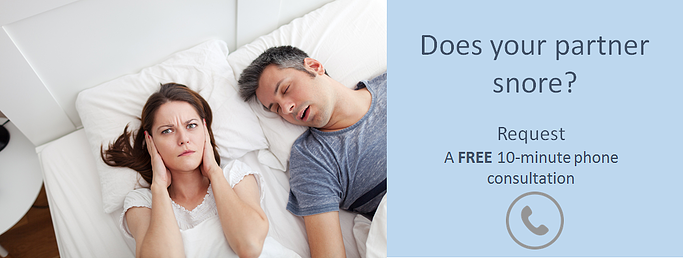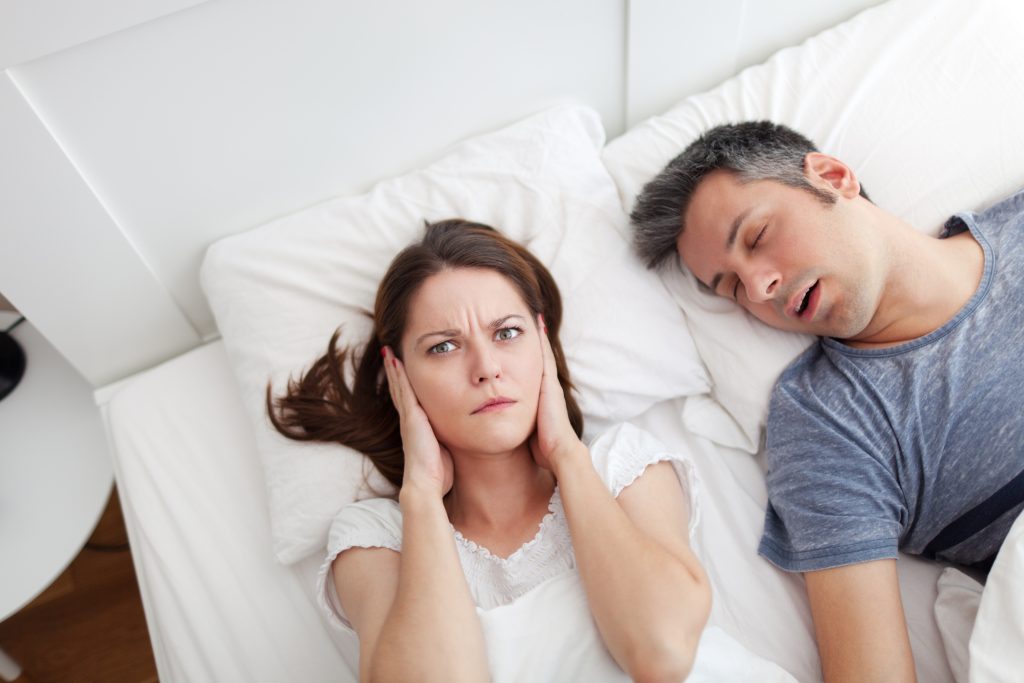Snoring is a condition that affects approximately 90 million Americans. According to the American Sleep Apnea Association, one-third to half of those that snore could be suffering from obstructive sleep apnea (OSA), which is a serious sleep disorder that needs to be treated.
How Do You Know if You Snore?
Walter “Sweetness” Payton, legendary running back for the Chicago Bears once said “When you’re great at something, they’ll tell you.” Although Payton was referring to his athletic ability in this quote, the same is true for snoring. When you snore, people will let you know!
Most often your partner will tell you when you are snoring. This is due to the loud, harsh noises you are making when you sleep. And the reason they’re telling you is because it makes sleeping difficult for them.
The affect snoring has on your partner is often portrayed humorously in movies and TV, as depicted in the commercials below.
What are the Causes of Snoring?
- Age. As you’re probably aware, when you begin to age your body naturally begins to relax and lose muscle tone, requiring more effort to keep your body defined. These processes also occur in the throat and tongue muscles causing the muscles there to relax and fall back into your airways causing obstructions that lead to snoring.
- Weight. Your weight can play a large role in whether or not you snore. If you are overweight you more than likely have an excess of built-up fatty tissues in your throat as well as poor muscle tone leading to a restriction of your throat muscles, thus causing snoring.
- Alcohol consumption, smoking, and medications. Alcohol, smoking, and some medications increase muscle relaxation allowing the flesh of the throat to relax and disrupt airflow. Smoking also irritates the nasal passages and throat muscles causing inflammation of these areas and further restriction of airflow.
Nasal and sinus problems.

- Sleep posture. Sleeping on your back puts you at a higher likelihood of snoring. The tissues at the back of the throat can more readily fall back and cause partial or complete blockage of the airways leading to snoring. To avoid snoring, try changing your sleeping posture by sleeping on your side.
Is snoring bad for your health?
Some of the causes of snoring and their effects are relatively benign and can easily be remedied by simple things such as changing your sleeping posture or moderating your alcohol consumption.
However, snoring can also be a red flag of a much more serious health issue, one that left untreated, could be fatal: obstructive sleep apnea.
Health Risks of Sleep Apnea
- Strain on Heart. Untreated obstructed sleep apnea often results in high blood pressure, which can lead to an increase in heart size creating a higher risk for heart attacks and strokes.
- Arrhythmias. People with sleep apnea run the risk of a higher chance of having cardiac arrhythmias, most commonly of which is atrial fibrilation. These are fluctuations in the hearts natural rhythm in which the heart may beat too fast, too slow, or irregularly. While arrhythmias are common and often nonthreatening, when they are coupled with sleep apnea they can be cause for serious cardiac concern.
- GERD (Gastroesophageal Reflux Disease) is a chronic digestive disease in which stomach acids back up into the esophagus and irritate its tender lining. Because of the disordered way a snorer or sleep apnea sufferer’s throat closes as air moves in and out of the lungs, changes in pressure can cause stomach acids to backup into the esophagus during sleep.
- Low oxygen levels in the blood. If you’re not breathing regularly your body isn’t getting the levels of oxygen in the blood stream that it needs. This can cause constricted blood vessels in the lungs, which may lead to pulmonary hypertension if left untreated.
- Long interruptions of breathing. One of the most common effects of obstructive sleep apnea is frequent interruptions of breathing. If an interruption in breathing lasts more than 10 seconds and is frequent throughout the night, which can lead to frequent waking from sleep.
- Frequent waking from sleep. If you suffer from obstructive sleep apnea and have frequent interruptions in breathing, you may not even realize that you frequently wake from sleep as your body is startled by the lack of oxygen causing you to wake and thus disrupting your sleeping cycles.
- Light sleeping. Many sufferers of untreated obstructive sleep apnea end up sleeping lightly as a way of attempting to try and keep their throat muscles tense enough to maintain airflow.
- Excessive Daytime sleepiness can affect both those that snore and those that sleep next to snorers. Not getting enough sleep throughout the night on a regular basis causes many to feel tired and drowsy during the day. The side effects of daytime sleepiness can range from poor work performance to personal injury. Lack of sleep results in a decrease of awareness and reaction time making drowsy driving extremely dangerous.
- Chronic headaches. Snorers often report frequent morning headaches, which are due to the alterations in the levels of oxygen and carbon dioxide in the bloodstream.
If you think you snore, but no one has had the courage to confront you yet, you’re in luck. Let your phone be the bad guy. You can download a number of different mobile apps that will record your snoring while you sleep. To find the right app for you, simply search for “snoring” and find the app that best meets your needs. Each app has other features as well to improve your sleep. And please know that while most of these apps are free to download, most of these apps will require purchase before all functionality can be accessed.

How Can I Stop Snoring?
If you snore, hopefully your partner has let you know you’re snoring without dumping a cup of water on you or hitting you with a stack of magazines. The good news is now that you know it’s a problem, you can take steps to fix it. And believe me, your partner will love you for it.
According to WebMD, there are 7 things you can do to help you stop snoring. These range from changing your sleep position, losing weight, avoiding alcohol before bed, etc. However, if you suffer from sleep apnea, no amount of home remedies or tips will help you quit snoring. The best thing you can do is visit a sleep specialist to conduct a sleep study. According to Carrington College, sleep apnea can lead to very serious issues if left untreated.
How Do I Know if Snoring is a Sign of a Bigger Problem?
The sleep experts at the Alaska Sleep Clinic understand the health concerns associated with OSA, which includes headaches, strain on the heart, and arrhythmias to name a few.
If you live in Alaska and are suffering from snoring, or worse OSA, request a free 10-minute phone consolation with our sleep experts and schedule a sleep study.













